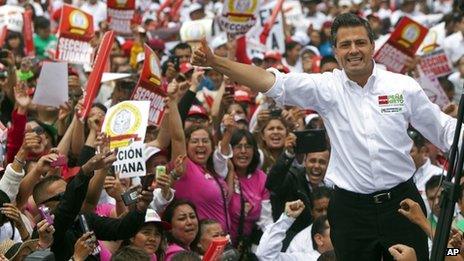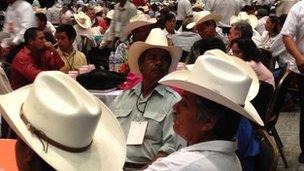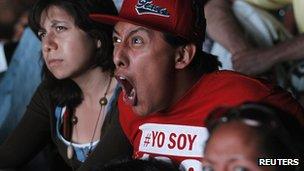Mexico election: Pena Nieto bids to shake off PRI's past
- Published

Enrique Pena Nieto insists his party, the PRI, has changed
The convention centre in the city of Tampico in northern Mexico is a sea of cowboy hats.
As a three-piece band strikes up traditional norteno music, the hardened cattlemen present make do with soft drinks and bottles of cold water.
"No chance of a drop of tequila?" one of them jokingly asks a waiter even though it is only 11 o'clock in the morning.
They have come to Tampico in the state of Tamaulipas to hear Enrique Pena Nieto, the frontrunner in the race to be president.

Many of the ranchers present in Tampico liked what they heard from Mr Pena Nieto
"Many here already openly support the candidate," says Daniel Elver Fernandez of the Cattle Ranchers Association of San Luis Potosi.
"Others want to hear his proposals to support the beef industry."
When the double doors finally swing open, and the telegenic candidate of the Institutional Revolutionary Party (PRI) sweeps in, the previously poker-faced ranchers are like fawning teenagers greeting their favourite pop star.
Mr Pena Nieto grabs the outstretched hands, receives hearty hugs from the cowboys and enthusiastic kisses from their wives, and pauses for every photo on route to taking the stage.
"He's gorgeous!" one woman says.
But Mr Pena Nieto himself is keen to demonstrate that he is more than just good hair and nice teeth.
"I am being evaluated by the people not on how I look, but on what have I done in the past, on my experience and what have I done as the Governor of the State of Mexico," he says.

Members of the #yosoy132 movement are vociferously opposed to Mr Pena Nieto
But not everyone is enamoured.
Tens of thousands of mainly young demonstrators have taken to the streets of Mexico City in recent weeks under the slogan #yosoy132 (I am the 132).
They oppose Mr Pena Nieto and what they say is biased coverage of his campaign by the country's biggest media outlet, Televisa.
The UK's Guardian newspaper earlier this month published allegations that Televisa had received payments for favourable items about the PRI's candidate in its news and entertainment programmes.
Televisa has denied this and demanded an apology from The Guardian.
Crime challenge
The PRI's opponents say the party has not shaken off its authoritarian and corrupt past and has links to the drug cartels.
But Mr Pena Nieto is adamant that the PRI, which ruled Mexico for much of the last century, has evolved.
"I can say categorically that in my government, there won't be any form of pact or agreement with organised crime," he told the BBC.
"It's not the path nor the route to greater security for the Mexican people."
A recent scandal involving two former Tamaulipas governors has, however, undermined efforts to rebrand the PRI.
The ex-governors are facing charges in the US and Mexico for money-laundering, corruption and links to organised crime.
The two, Tomas Yarrington and Eugenio Hernandez, both members of the PRI, deny any wrongdoing.
"I think the party has acted with complete clarity," says Mr Pena Nieto.
"We've said that it corresponds to those men who have been accused, though, it should be said, not yet formally tried in court, to form their defence in the face of such accusations."
Tamaulipas is considered the most dangerous state in Mexico, where two powerful drug gangs, the Zetas and the Gulf Cartel, operate and often clash.
It has seen horrific crimes in the drug war, including the massacre of nearly 200 people in San Fernando in 2011.
"The first objective is to reduce the violence. Second is to build greater collaboration between different levels of government," Mr Pena Nieto says.
Mr Pena Nieto's detractors say he lacks substance and only speaks in general terms about what he would actually do to stem the violence.
On the day we met him, a car bomb exploded outside a car dealership in the state capital, Ciudad Victoria. Hours later, 14 mutilated bodies were dumped outside the municipal president's office in the town of El Mante.
Small town, big hell
The people of Tamaulipas have grown used to the extreme violence.
Susana: 'Anyone who speaks out is threatened or simply disappears'
We met Susana (not her real name). Her experience is unusual because she is still alive to tell her story.
She was dating a man who was involved in organised crime. She escaped the relationship but still fears for her life.
"The men I got involved with weren't simply drug traffickers," she says. "They were part of the government's security organisations... police and soldiers."
Susana is sure the PRI will win again in Tamaulipas, but is dismissive of the suggestion that the party has changed.
The drug traffickers continue to hold sway in the state, she believes.
"We have a saying: pueblo chico, infierno grande (small town, big hell). Well, we're living in a small town and this is a hell that's just too big."